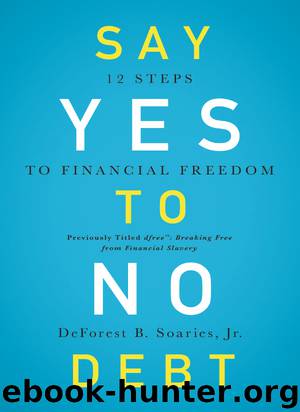Say Yes to No Debt by DeForest B Soaries Jr

Author:DeForest B Soaries, Jr.
Language: eng
Format: epub
Tags: ebook
Publisher: Zondervan
Published: 2015-09-30T16:00:00+00:00
The Price of Prosperity
Another barrier to maximizing your success that is addressed in the dfree® program has to do with one’s attitude toward wealth. So far we’ve examined some of the ways our culture reinforces aff luence, wealth, and riches — assuming that we all view these as positives. Interestingly enough, many Christians often have a backlash reaction that impedes their receptivity to getting ahead. Many of their negative ideas on wealth are tied to the story of the young man who visited Jesus asking what he must do to have eternal life. It’s usually referred to as the story of the “rich young ruler” and can be found in Luke 18:18 – 25.
Jesus responds to the young man’s question by exploring the man’s notion of what it means to be “good” and by emphasizing the importance of keeping God’s commandments. When the young man replies that he has kept God’s commandments since boyhood, Jesus tells him that there’s then only one thing he can do: “Sell everything you have and give to the poor, and you will have treasure in heaven. Then come, follow me” (Luke 18:22). Apparently not what the young man had hoped to hear, since his response is described as being “very sad” because he had “great wealth” (v. 23).
Seeing the young man’s crestfallen response — and this is where many Christians point — Jesus says, “How hard it is for the rich to enter the kingdom of God! Indeed, it is easier for a camel to go through the eye of a needle than for [someone who is] rich . . . to enter the kingdom of God” (vv. 24 – 25). But Christ goes on to explain that it’s not impossible, since all things are possible with His heavenly Father, and that, ultimately, anyone who gives up everything for God’s kingdom will receive back more than it was worth many times over.
The rationale behind Christ’s response — because it’s clear He is not condemning rich people here — is that being wealthy makes it more difficult to need help, need other people, and ultimately to need God. If we can go out and afford to buy anything we want, then we’re probably not praying about them and relying directly on God to provide them. Instead, we’re focused on our latest purchase, insuring it, renting a storage unit for it, and wondering why it’s taking so long for the next version to come out. The more we have, the more tempted we are to cling to material possessions as idols. As Jesus explains in a different conversation, “What good will it be for [someone to gain] the whole world, yet forfeit [their] soul? Or what can [anyone] give in exchange for [their] soul?” (Matthew 16:26).
When we can attain what we want ourselves, then we’ve added a layer that often obscures how desperately we truly need God. The only thing holy about being in debt is that we eventually have nowhere to turn, or no one to turn to, who can help except our Father.
Download
This site does not store any files on its server. We only index and link to content provided by other sites. Please contact the content providers to delete copyright contents if any and email us, we'll remove relevant links or contents immediately.
| Budgeting & Money Management | College & Education Costs |
| Credit Ratings & Repair | Retirement Planning |
The Compound Effect by Darren Hardy(7559)
Tools of Titans by Timothy Ferriss(6947)
Nudge - Improving Decisions about Health, Wealth, and Happiness by Thaler Sunstein(6633)
Win Bigly by Scott Adams(6312)
Pioneering Portfolio Management by David F. Swensen(5606)
Deep Work by Cal Newport(5464)
Principles: Life and Work by Ray Dalio(5322)
The Barefoot Investor by Scott Pape(5309)
Rich Dad Poor Dad by Robert T. Kiyosaki(5149)
Grit by Angela Duckworth(4737)
The Slight Edge by Jeff Olson(4722)
Discipline Equals Freedom by Jocko Willink(4635)
Digital Minimalism by Cal Newport;(4542)
The Motivation Myth by Jeff Haden(4527)
You Are a Badass at Making Money by Jen Sincero(4254)
The Four Tendencies by Gretchen Rubin(4024)
The Confidence Code by Katty Kay(3566)
Eat That Frog! by Brian Tracy(3514)
Captivate by Vanessa Van Edwards(3297)
